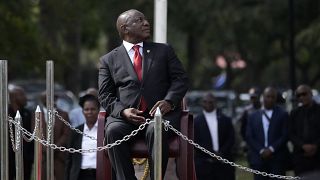Sweden
Two former executives at a Swedish oil company go on trial in Stockholm on Tuesday accused of complicity in war crimes committed by Sudan's regime between 1999 and 2003.
Swede Ian Lundin and Swiss national Alex Schneiter are accused of asking Sudan's government to make its military responsible for security at the site of one of Lundin Oil's exploration fields, which later led to aerial bombings, killing of civilians and burning of entire villages, according to the prosecution.
Lundin was chief executive of family firm Lundin Oil, now known as Orron Energy, from 1998-2002, and Schneiter was vice president at the time.
The pair have denied any wrongdoing.
The trial is set to be the biggest in Swedish history, following a 13-year probe, a more than 80,000-page investigation report, and with closing arguments scheduled for February 2026.
The two, who were formally named as suspects in 2016, face the formal charge of "complicity in grave war crimes" committed during the rule of Omar al-Bashir.
After Lundin Oil struck oil in 1999 in the "Block 5A" field in what is now South Sudan, the Sudanese military, together with an allied militia, "led offensive military operations to take control of the area and create the necessary preconditions for Lundin Oil's oil exploration," Sweden's prosecution service said in a 2021 statement announcing the charges.
"In our view, the investigation shows that the military and its allied militia systematically attacked civilians or carried out indiscriminate attacks," public prosecutor Henrik Attorps said.
- 'Complicity' -
This included "aerial bombardments from transport planes, shooting civilians from helicopter gunships, abducting and plundering civilians and burning entire villages and their crops."
Prosecutors argue that the accused were complicit because Lundin Oil knew that asking Sudan's government to make the military responsible for security meant it would take control of the area by "military force".
"What constitutes complicity in a criminal sense is that they made these demands despite understanding, or in any case being indifferent to, the military and the militia carrying out the war in a way that was forbidden according to international humanitarian law," chief public prosecutor Krister Petersson said.
If convicted, Lundin and Schneiter risk life sentences.
The prosecution has already requested that the two be banned from any business undertakings for 10 years.
It has also asked for the confiscation of 2.4 billion kronor ($218 million) from Orron Energy, equivalent to the profit the company made on the sale of its Sudan operations in 2003.
- 'Waste of time' -
The defence has argued that the prosecution's case does not hold up.
"Our opinion is that these two years that will now be spent in the district court will be a huge waste of time and resources," Torgny Wetterberg, a lawyer for Ian Lundin, told AFP on the eve of the trial.
Wetterberg said the defence disagreed with the prosecution's descriptions of events, and that it had built its case on circumstantial claims with no concrete evidence.
"From our perspective it is a mystery that the prosecutor is moving forward with this case," Wetterberg said, adding that he was confident the prosecution had no chance of getting a conviction.
Sweden can prosecute crimes committed abroad in its court system, though the government had to give its approval to indict a foreign national for crimes committed abroad.
When the charges were brought, Schneiter argued that the principle of universal jurisdiction did not apply to him as he was neither a resident nor a citizen.
His objection was eventually dismissed by Sweden's Supreme Court, ruling in November 2022 that "some form of connection to Sweden" was necessary for an indictment and that Schneiter's connection "in other regards" was "sufficient".











01:38
Sexual violence in conflict increased by 50% in 2023, says UN
01:35
Sudan war fuelled by weapons from foreign actors in violation of sanctions - UN
01:02
Pics of the day: April 15, 2024
02:00
Sudan war: risk of famine looms
02:02
Sudan: One year of unrelenting war with no end in sight
01:10
Russia expands diesel exports to Sudan amidst EU embargo